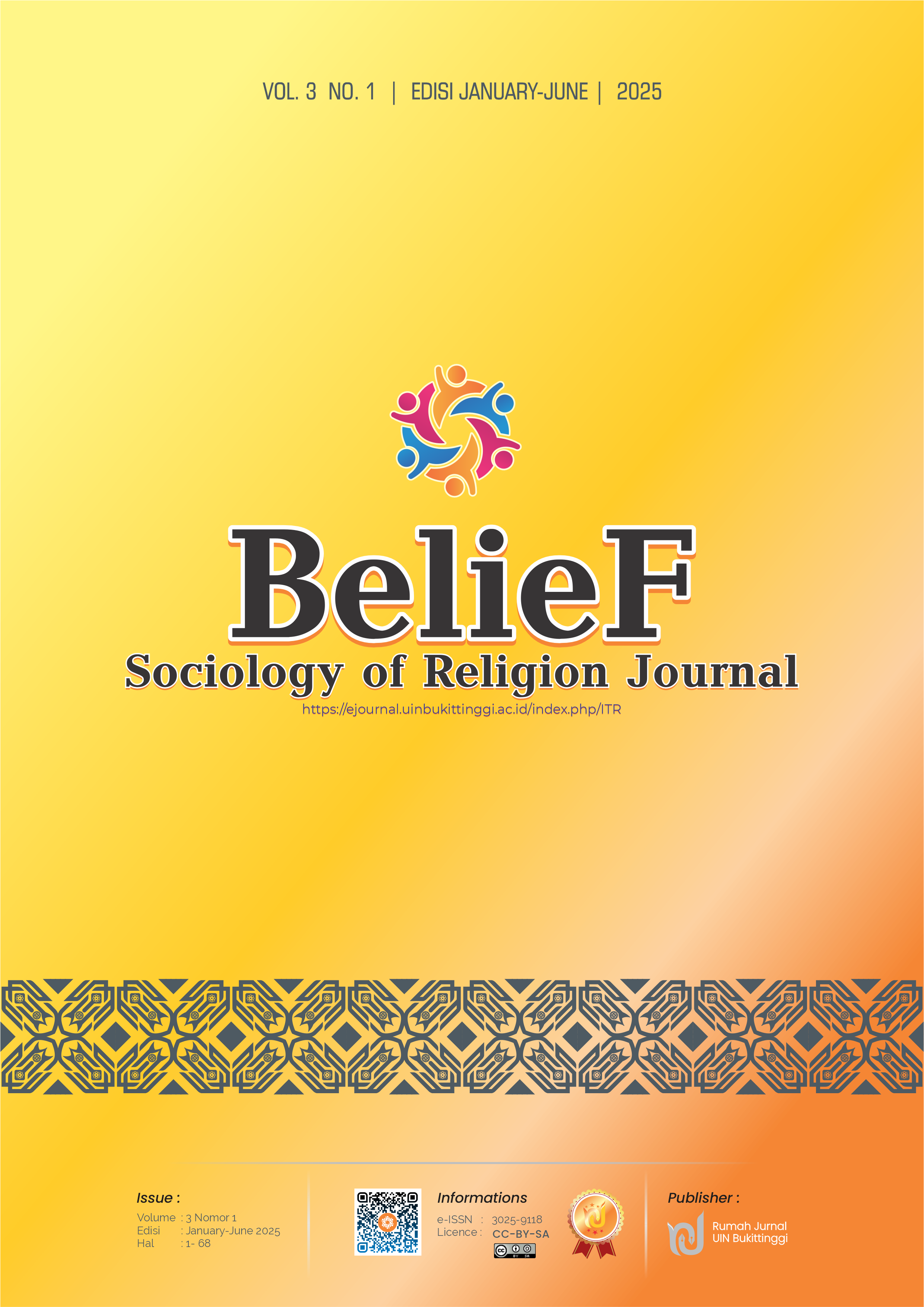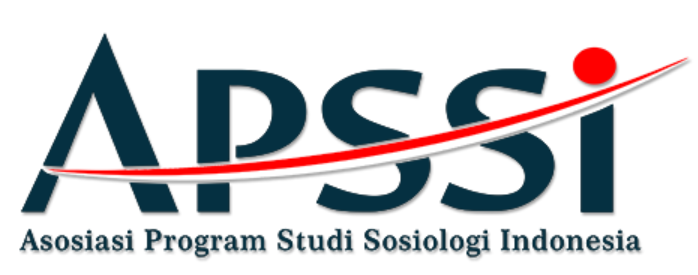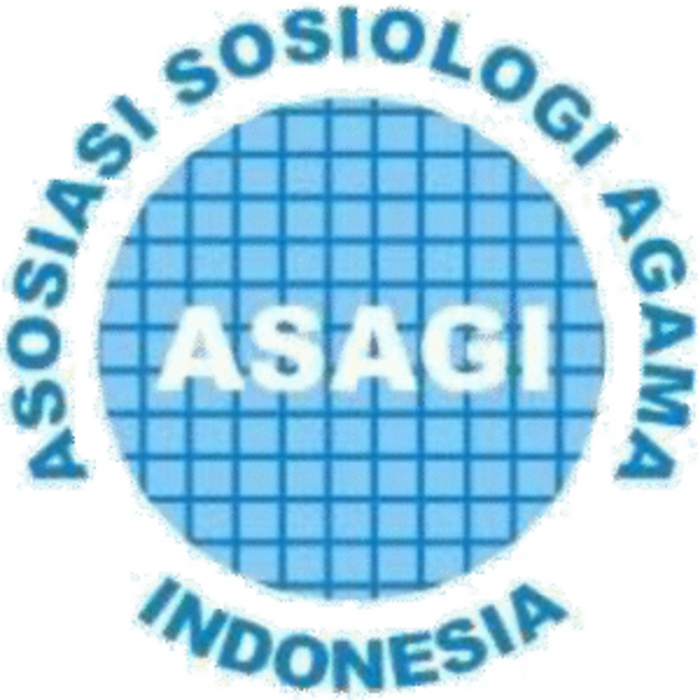Charisma, Tradition, and Rationality: The Authority of Teungku in Maintaining Social Order
DOI:
https://doi.org/10.30983/belief.v3i1.9526Keywords:
Teungku, Weber's Authority, Social Order, Aceh JayaAbstract
The study examines the role of Teungku—local religious leaders in maintaining social order in Gampong Krueng Tuynong, Aceh Jaya. Drawing on Max Weber’s theory of authority, the study analyzes how the three types of authority—traditional, charismatic, and legal-rational—interact and function synergistically within informal religious leadership. Using a qualitative narrative method, data were collected through in-depth interviews, field observations, and documentation. The findings indicate that Teungku gains legitimacy through lineage, moral charisma, and involvement in village governance structures. Their leadership, rooted in cultural heritage and ethical example, positions them as mediators, educators, and guardians of social harmony. Empirically, this study demonstrates that the stability of post-conflict village social structures can remain stable through informal leadership that is not formally institutionalized, yet holds socially recognized authority. Theoretically, it offers a new synthesis of Weber’s typology by showing that, in local contexts such as Aceh, the three forms of authority do not operate in isolation but instead converge functionally within the figure of the Teungku. Thus, this article contributes to a broader understanding of how informal religious authority can serve as a stabilizing force in communities shaped by layered values, traditions, and local norms.
References
Abdullah, Irwan. 2010. Konstruksi Dan Reproduksi Kebudayaan Pustaka Pelajar. Pustaka Pelajar.
Adair-Toteff, Christopher. 2005. “Max Weber’s Charisma.” Journal of Classical Sociology 5(2):189–204. doi: 10.1177/1468795X05053491.
Azyumardi Azra, Fathurahman, Oman. 2004. The Origins of Islamic Reformism in Southeast Asia: Networks of Malay-Indonesia and Middle Eastern “Ulama” in the Seventeenth and Eighteenth Centuries. Vol. 1.
Barton, G. 2002. Abdurrahman Wahid: Muslim Democrat, Indonesian President. UNSW Press.
Bhattacharya, Anindya, Anirban Kar, Sunil Kumar, and Alita Nandi. 2022. “Patronage and Power in Rural India: A Study Based on Interaction Networks.”
Bruinessen, Martin Van. 1995. Kitab Kuning, Pesantren, Dan Tarekat: Tradisi-Tradisi Islam Di Indonesia. Vol. II.
Burhani, Ahmad Najib. 2018. “Pluralism, Liberalism and Islamism: Religious Outlook of Muhammadiyah.” Studia Islamika 25(3). doi: 10.15408/sdi.v25i3.7765.
Cahnman, Werner J., Guenther Roth, and Claus Wittich. 1969. “Max Weber-Economy and Society. An Outline of Interpretive Sociology.” Social Forces 48(2). doi: 10.2307/2575272.
Fiol, C. Marlen., Drew Harris, and Robert House. 1999. “Charismatic Leadership.” The Leadership Quarterly 10(3):449–82. doi: 10.1016/S1048-9843(99)00021-1.
Hasan, Noorhaidi. 2009. “Islamizing Formal Education: Integrated Islamic School and a New Trend in Formal Education Institution in Indonesia.” Security 299(5613).
Hefner, Robert W. 2011. Civil Islam: Muslims and Democratization in Indonesia.
Jermier, John M. 1993. “Introduction—Charismatic Leadership: Neo-Weberian Perspectives.” The Leadership Quarterly 4(3–4):217–33. doi: 10.1016/1048-9843(93)90032-O.
Levay, Charlotta. 2010. “Charismatic Leadership in Resistance to Change.” The Leadership Quarterly 21(1):127–43. doi: 10.1016/j.leaqua.2009.10.010.
M. Kasim, Fajri, and Abidin Nurdin. 2020. “Study of Sociological Law on Conflict Resolution Through Adat in Aceh Community According to Islamic Law.” Samarah: Jurnal Hukum Keluarga Dan Hukum Islam 4(2):375. doi: 10.22373/sjhk.v4i2.8231.
Mboh, Lovelyne. 2021. “An Investigation into the Role of Traditional Leaders in Conflict Resolution: The Case of Communities in the Mahikeng Local Municipality, North West Province, South Africa.” African Journal on Conflict Resolution 21(2).
Muntasir, Muntasir, Iskandar Zulkarnaen, Muhammad Aminullah, Muslem Hamdani, and Bimby Hidayat. 2025. “Power Structures and Religious Legitimacy: The Influence of Dayah Ulama in the Politics of Aceh Analyzed Using Powercube Theory.” Jurnal Ilmiah Peuradeun 13(1):437. doi: 10.26811/peuradeun.v13i1.1625.
Nasution, H. 1979. Islam Ditinjau Dari Berbagai Aspeknya. Universitas Indonesia.
Nur Ichwan, Moch. 2005. “‘Ulamā’, State and Politics: Majelis Ulama Indonesia after Suharto.” Islamic Law and Society 12(1).
Patra, Soumyajit, and Tattwamasi Paltasingh. 2024. Sociology of Rationality. London: Routledge India.
Sanyal, Usha. 2007. “Yoginder Sikand, Bastions of the Believers. Madrasas and Islamic Education in India.” South Asia Multidisciplinary Academic Journal. doi: 10.4000/samaj.216.
Sheranova, Arzuu. 2020. “The Interplay Between Formal and Informal in Conflict Prevention, Mediation and Community Security Provision in Kyrgyzstan.” Pp. 117–35 in Transformation and Development. Cham: Springer International Publishing.
Tönnies, Ferdinand. 2012. “COMMUNITY AND CIVIL SOCIETY.” in Ferdinand Tönnies Community and Civil Society.
Umam. n.d. “Upacara Adat Aceh Yang Dilestarikan Dari Meugang Hingga Meuleumak.” Gramedia Blog. Retrieved (https://www.gramedia.com/literasi/upacara-adat-aceh/).
Weber, M., G. Roth, and C. Wittich. 1978. Economy and Society: An Outline of Interpretive Sociology. University of California Press.
Whimster, Sam. 2024. “Max Weber: Rational Action, Rationalism, and Rationalisation.” Pp. 37–50 in Sociology of Rationality. London: Routledge India.
Yinger, J. Milton, Clifford Geertz, and Douglas Oliver. 1961. “The Religion of Java.” American Sociological Review 26(3). doi: 10.2307/2090698.
Downloads
Published
How to Cite
Issue
Section
Citation Check
License
Copyright (c) 2025 Mimi Rahmawati, Siti Ikramatoun

This work is licensed under a Creative Commons Attribution-ShareAlike 4.0 International License.




